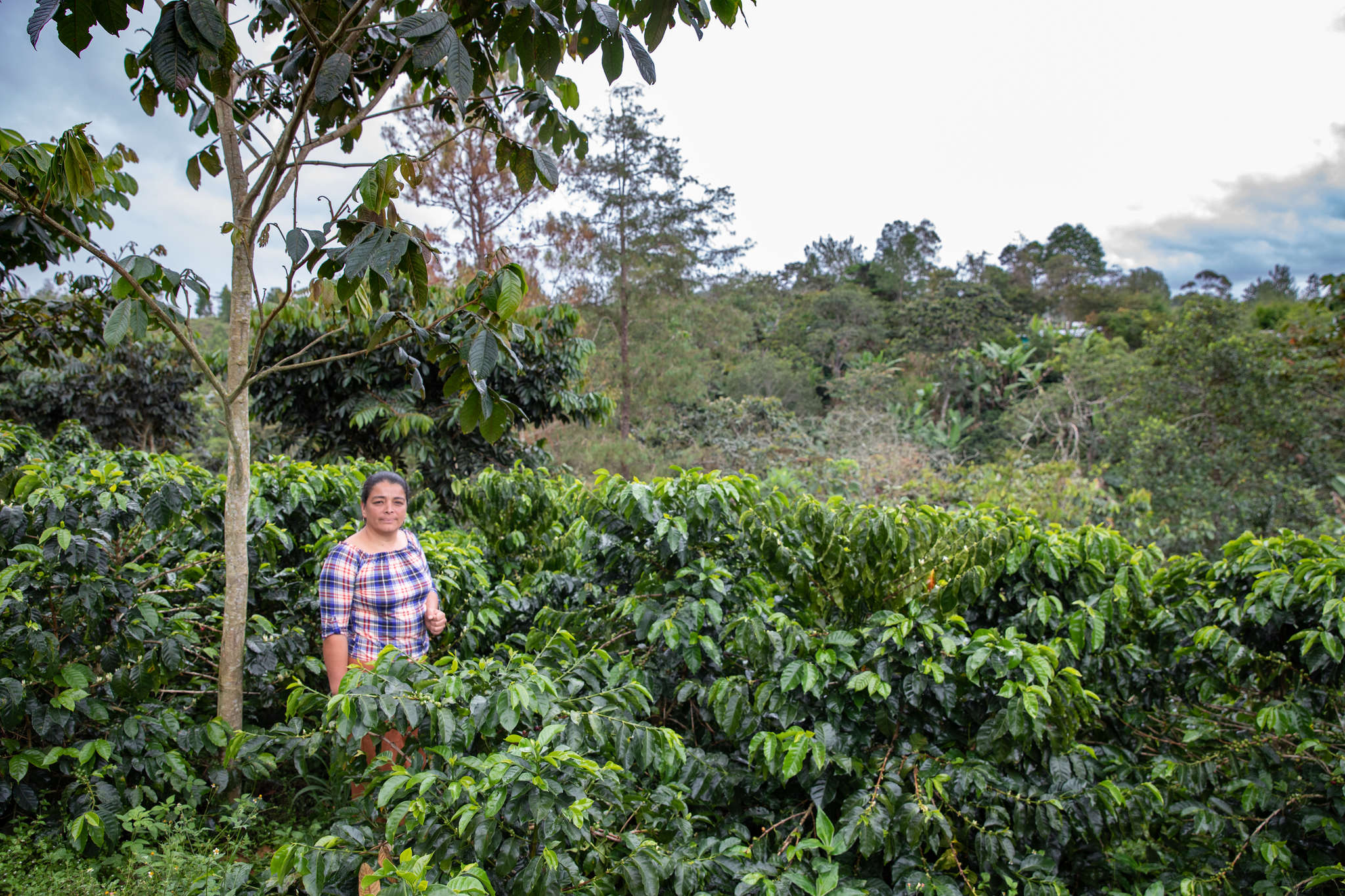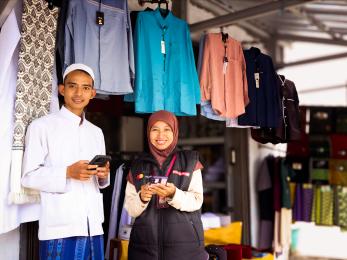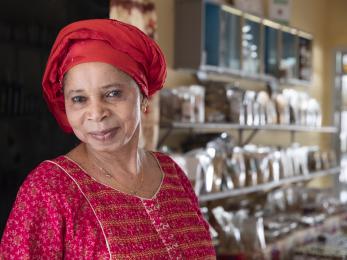How we’re investing in entrepreneurs to improve lives around the world
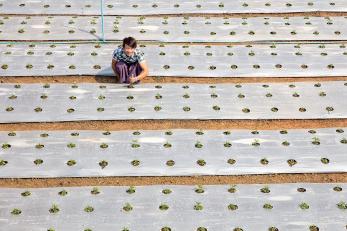
Around the world, social entrepreneurs are at the forefront of new business models — and often technologies — that have the potential to deliver sustainable impact at scale.
At Mercy Corps, we believe that social entrepreneurs have the talent, drive and versatility to design products and services to positively impact millions of people in fragile places and emerging markets. But, these ambitious innovators often don’t have access to the right capital and support they need for their ventures first to survive and then thrive.
That’s where our Social Venture Fund comes in. Created in 2015, it’s a seed-stage impact investment fund designed to help early-stage entrepreneurs overcome barriers to growth by providing capital and strategic post-investment support. We’ve made twelve investments in innovative startups operating in financial services, agriculture, last-mile logistics and youth employment.
We have a global infrastructure of more 5,000 team members, 40+ country offices, groundbreaking programming, deep technical expertise, and trusted relationships with corporate partners, governments, civil society and the private sector. That makes us a tremendously valuable asset and partner to social entrepreneurs. Entrepreneurs we work with are equally valuable to us as they help us learn and develop new solutions. We are stronger together.
And together we endeavour to improve the lives of under-served populations by exploring approaches that harness abundance, expand opportunity and generate social impact at real scale. We believe this marriage of social entrepreneur and nonprofit will gradually become the norm — because it works.
Read more below to learn about some of the startups we’re working with and how they’re changing lives in their communities.
FarmDrive

In Kenya, many smallholder farmers lack access to small loans to help them buy the quality products they need to improve their yields and incomes. This lack of financing is partially due to a lack of credible risk-assessment information on borrowers that can be shared with lenders.
FarmDrive’s founders saw these issues firsthand in their own farming families and communities. Rita Kimani and Peris Bosire met in a computer science programme and founded their startup right after graduating.
FarmDrive generates real-time credit reports for smallholder farmers, allowing them to access loans. Their proprietary platform collects traditional and alternative data points like revenue and satellite imaging to create detailed yield estimates and assess credit risk and then delivers loans via mobile money. As a result, farmers can increase their crop yields, improve their incomes and invest their additional revenue back into their families and communities.
“Mercy Corps has played a pivotal role in FarmDrive’s advancement through funding, strategic advisory and technical assistance,” says Kimani. “As one of the first early-stage investors, the funding we received from Mercy Corps was critical in developing our minimum viable product.”
FarmDrive aims to facilitate access to $400 million in loans to 1 million smallholder farmers by 2021. FarmDrive has a solid start toward this goal and strategic partnerships in place to help it get there. Since launch, the company has distributed over $300,000 in loans to farmers in Kenya, 37 per cent of whom are youth farmers.
Vega Coffee
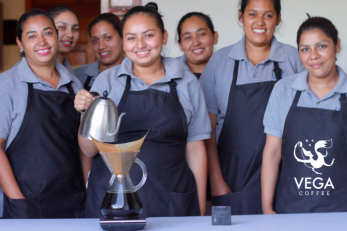
In the coffee supply chain, the profit is captured by the processors. Middlemen buy raw, green coffee from farmers at next to nothing while farmers take on the high risk to produce it. Then the coffee goes back to the United States, where 90% of the profit is realised and no sale prices are communicated back to farmers. This system creates a cycle of subsistence farming where most farmers live well below the poverty line, bound to their land by a broken supply chain.
Vega is fixing this; placing farmers at its core, Vega pushes value-add coffee processing (cupping, selecting, roasting, etc.) down to the farm level, allowing farmers — the majority of which are women in post-conflict zones—to increase their incomes by four times. Vega then manages the sales, marketing and logistics to ship the roasted coffee from the farm directly to consumers in the US within 5 days of roasting — at the height of freshness.
Vega’s model allows consumers to meaningfully support farmers while getting the finest coffee varietals, at a fair price, delivered right to their door.
“We believe that only through direct transparency can we achieve our vision of transforming a historically antiquated and opaque supply chain to one that is transparent, equitable and sustainable — and damn it, produces excellent coffee.” says Noushin Ketabi, co-founder.
Of the more than 5,300 farmers reached with Vega’s first contracts, 56 per cent are women, as are 91 per cent of its full-time employees. Vega has invested more than $500,000 in coffee-growing communities since its founding.
Lynk
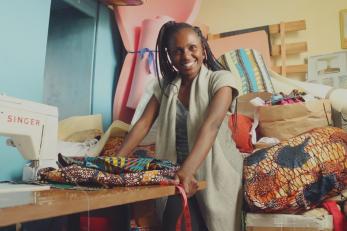
The majority of the labour force in Kenya operates in the informal sector, with jobs and paycheques coming infrequently. The informal economy is inefficient, not transparent, and often associated with poverty, lower wages, poor working conditions and lower productivity.
At the same time, almost half of young people in sub-Saharan Africa experience long-term unemployment. While jobs are available, there is a mismatch between jobs and skills in the youth workforce.
Lynk co-founders Adam Grunewald and Johannes Degn decided to help change that by connecting households and businesses with qualified workers, addressing employment issues and helping people in need of services.
Lynk is an online platform that does just that. After creating a free profile and having their credentials verified, workers are alerted via SMS when job requests that require their skills — like carpentry, plumbing, cooking, tailoring — are placed on Lynk’s website. Workers respond to alerts with a bid price, and employers then select among competing bids and review worker profiles before hiring. As informal workers accrue more job experience and earn positive customer satisfaction ratings on their profiles, they can build their resumes and position themselves for more formal work, higher wages and access to credit.
The platform has drastically changed job prospects for Anne Christine, a Lynk user, who was on the verge of giving up on her passion of designing and tailoring clothes. Then one of her clients recommended she join the Lynk platform. Within a year, Anne Christine completed 75 jobs and earned over $1,500. At the same time, she achieved an impressive rating of 4.8 out of 5 stars - growing her profile and helping her secure future jobs.
“I would have given up with tailoring were it not for Lynk,” says Anne Christine. She says she no longer has to worry about where her next client will come from and can even market her designs for free on Lynk.
Lynk aims to have its users complete 154,000 jobs per month across 10 cities in East Africa by 2023. Lynk has recruited over 1,000 workers onto the platform who have completed over 19,616 jobs—earning workers $1,270,000 in income, or an average additional monthly income of $163. Most workers (47 per cent) on the platform are young people, and 30 per cent are women.
Learn more about the work we do around the world:
- Explore our Khabrona.Info app, which connects Syrian refugees to the resources they need to rebuild their lives.
- Learn about our partnership with Google — together we’re helping people in Puerto Rico recover from Hurricane Maria.
- Meet Omar, one of our team members in Jordan, who works with young people to give them hope for the future.
